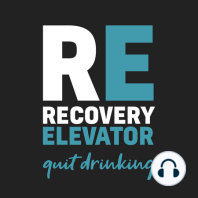43 min listen

RE 221: In Sobriety, We Must First Learn Who We Aren’t
RE 221: In Sobriety, We Must First Learn Who We Aren’t
ratings:
Length:
50 minutes
Released:
May 13, 2019
Format:
Podcast episode
Description
Liz, with a sobriety date of July 8, 2017, shares her story. Workshops for the Bozeman, MT, retreat in August are lined up! There are still a few spots left! You can find more information about this event here On today’s podcast Paul talks about a common misconception people have as they move forward in a life without alcohol. That misconception is that when we get sober, we will finally find out who we really are. But that isn’t how it works. We do get to that point, but first we must find out who we aren’t. During this phase; people, places, things, ideas, thought patterns, identities, that are no longer in line with your new direction in life will start to fade away. Just allow this process to happen. Recovery is all about action, but this is a process of inaction. This is a recurring process. SHOW NOTES [10:05] Paul introduces Liz. Liz is 29 years old and is originally from Indiana but is now living in Frankfurt, Illinois. She is a licensed, board certified, acupuncturist and Chinese herbalist. She is married. For fun she enjoys working out, hiking, yoga, reading, going to concerts, and she is a big foodie. [11:00] Give us a little background about your drinking. Liz started drinking when she was about 12 or 13 years old. She was an only child and grew up in an abusive household, with addict parents (who are still active in their addictions). She was sexually abused by her father and his friends between the ages of 8-10. All of this trauma laid dormant until Liz was 21 years old. Liz’s father would give her drugs and alcohol whenever she would ask, she believes it was his way of keeping her numb, so that she would never speak up. Her house was the party house in high school, and even middle school. Liz dated an ecstasy dealer, which led her into an ecstasy addiction and an overdose. At the age of 20 she went to jail for underage drinking. She moved to Chicago when she was 21. She was working and going to school full time, and drinking. [16:55] You are the first person interviewed that has said they always knew they had a drinking problem, please explain. She knew that when she started drinking at 12/13 years old that she was drinking to cover something up. It was always a numbing agent for Liz, never a feel-good agent. It was just the way I coped with everything. Knowing she needed help she found an addictions counselor in Chicago. Within the first session the counselor was telling her she was an alcoholic and addict, needed AA and to enter inpatient treatment. She continued to go to therapy, but did not enter into inpatient. It was during this time that the sexual abuse from her childhood started to surface and her drinking and drugging intensified. [20:24] What was it like when these memories started to bubble up? Liz says this is when the downward spiral of her addiction really started to intensify. She was still going to work and school, but was blacking out nightly. If she didn’t go to bed drunk, she would have vivid night terrors. [22:23] Tell us about what it was like when you were meeting with the hypnotherapist. She assessed Liz, told her she needed AA and to stop drinking and basically told her she was not willing to work with her unless she stopped drinking. Liz told her she was unwilling to stop drinking and insisted on the therapy. The therapist agreed to proceed although she told her she may not get much out of it due to her alcohol consumption. Liz showed up for every appointment, about twice a week for 6 months. It was the most intense therapy Liz has ever gone through. She relived the trauma and was able to heal from it. [24:45] What happened next? She continued to see the therapist, continued to drink, and she finished school. Once she was done with school she moved to Illinois. Her drinking//drugging slowed to the weekends, although she was still blacking out and her weekends were spent hungover. She tried
Released:
May 13, 2019
Format:
Podcast episode
Titles in the series (100)
024: The Other Side Part 2 | Emma is the daughter of an alcoholic and is headed into her junior year of high school: Jim shares how surrendering is vital to his sobriety. by Recovery Elevator ?